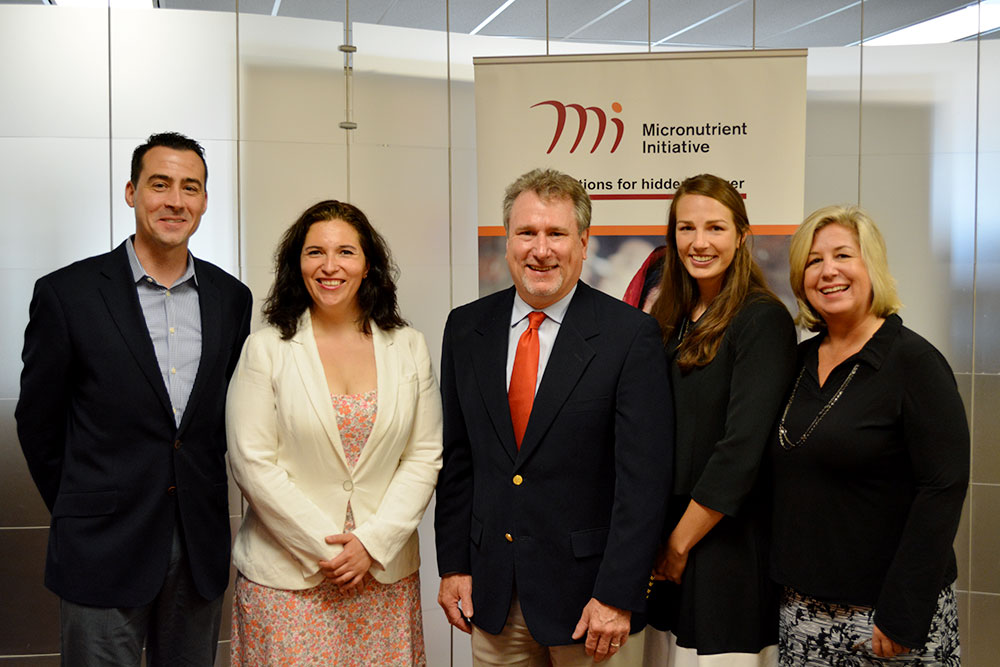Field Story
2022: celebrating milestones, innovations and making a difference globally
December 30, 2022
Improving nutrition so all children can survive and thrive
A conversation with Greg Reinhart, M.S., Ph.D., Vice President of Research and Nutrition, The Mathile Institute.
Posted on September 1, 2016

From left to right: Chris Lannon (MI), Luz Maria De-Regil (MI), Greg Reinhart (The Mathile Institute), Allison Verney (MI), Chris Dendys (MI).
The Mathile Institute for the Advancement of Human Nutrition is focused on improving nutrition for the world’s children. The Micronutrient Initiative and Mathile Institute collaborate on nutrition research to build the global evidence base and support guidelines and policies to address malnutrition challenges around the world. Recently, we sat down with Greg Reinhart for a brief conversation on the importance of nutrition research to change young lives for the better.
Where do you think are the biggest opportunities for low income countries to alleviate malnutrition?
GR: We have to do everything in our power to make sure that all pregnant women and all young children are completely covered nutritionally. Every child must be properly nourished, especially during the critical 1,000 day window. It’s a global moral mandate.
Why is good research important to informing policy and programming?
GR: There are never enough resources or funds for all the programs required to properly nourish every single child and adult on this planet. The scarce funds and resources that are available must be allocated to areas where there is a known benefit – and data and good science are key as they help drive policy changes and ensure sustainable programming. Monitoring and evaluation are critical to assess how we are working with communities and interacting with beneficiaries. Without accurate evaluation, it’s hard to know if we’re doing the best with our limited resources. Monitoring and evaluation helps policy-makers devise more effective programs, and provides more tools to people working in the field to help them achieve the intended outcome.
MI and Mathile have partnered for a number of years. What are some of your favourite highlights of this partnership?
Greg Reinhart (GR): A couple of projects come to mind as being catalytic, with results that will help drive understanding and fill the knowledge gap. These projects will facilitate programmatic changes that will improve nutrition for young children and, in some cases, women of reproductive age.
For example, the tea-picker study, which was conducted in West Bengal, India. In this 10-month study, more than 200 female tea pickers between 19 and 55 received double-fortified salt (DFS), which includes both iron and iodine. The study showed that DFS improved iron status, which was expected but nice to see in a community-based setting. The data also showed increased cognition and perception, which was surprising because the loss of cognitive abilities cannot necessarily be reversed. Finally, there were promising results that seem to indicate that women who received supplementation were more efficient in their work. In this study, MI was instrumental in field staff selection, and had key partnerships all over India, as well as with the local NGO.
The other study I think is really neat is Project Grow Smart, which was conducted in Hyderabad, India. This study looked at multiple micronutrient powder (MMP) supplementation to infants and toddlers, and the results are pretty exciting. Like in the tea-picker study, the project data showed the impact of MMP on cognitive abilities, particularly with children that started out with lower developmental indices. The micronutrients really appear to give them the best chance to maximize their learning opportunities and translate that into increased cognitive abilities. There are potential long term benefits to these children including better performance at school, less chronic disease and higher earning potential as adults.
The global nutrition community knows the solutions to improve nutrition and health for the world’s most vulnerable but implementation and scale continue to remain a challenge. What do you consider the remaining stumbling block in executing what we know into real action on the ground?
GR: That’s a good question. It’s a hard one. It is difficult to move from understanding to practice. Most people want to do what’s best for themselves, their families and their country. Many of the best programs are government driven and governments can be part of the solution. In some cases, however governments can be part of the problem, with barriers caused by bureaucracy or lack of resources. The other challenge is changing the habits and practices of individuals. People all around the globe prefer the familiar, and it’s really hard to overcome that. On a micro scale, we need to gain the trust of people at the local level, find a thought leader or an early adopter and then model that to the community. On a macro scale, it’s about identifying courageous political leaders who can find a way, and who have the will to see it through. This is easy to say but it’s really hard to do in practice.